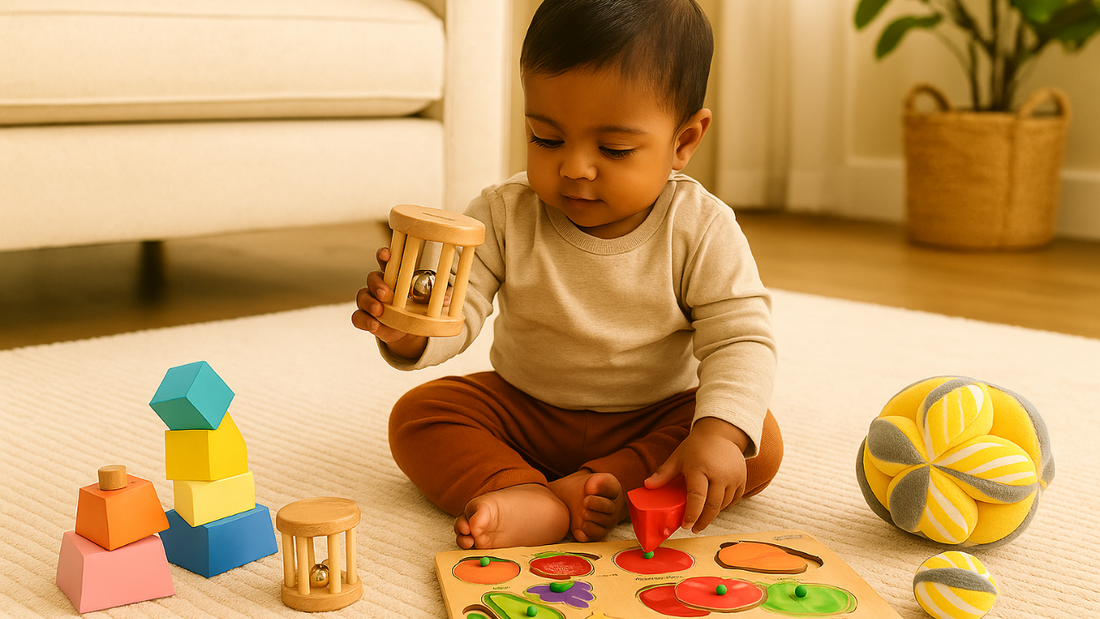
Understanding Cognitive Skills for 0 to 3 Year Olds: How Tiny Minds Grow Big Brains
LiLLBUDEver seen your baby stare intently at a spinning toy? Or your toddler try to stack a block just right before it topples? That’s more than just cute—it’s cognition in action.
Your child's brain grows faster than it ever will from birth to age three. During these early years, cognitive development is in full swing as babies and toddlers learn how the world works—through exploring, observing, remembering, and solving mini “mysteries” every day.
This guide will explain the fundamental cognitive abilities that children develop between the ages of 0 and 3 years, including problem-solving, memory, and attention, as well as how to foster them through play and daily routines.
What Are Cognitive Skills?
Cognitive skills are the mental abilities that help children think, understand, learn, and remember. These skills lay the groundwork for language, problem-solving, focus, imagination, and decision-making in later life.
These abilities set the stage for later success in language, problem-solving, concentration, creativity, and decision-making.
In early childhood, cognitive development is driven by interaction with people, objects, and the environment. Infants and toddlers don’t need lessons—they need hands-on experiences.
Let’s dive into the major cognitive building blocks of the early years.
1. Attention
Attention is the ability to focus on a person, object, or task.
The ability to concentrate on a task, person, or object is known as attention. While infants have short attention spans, they eventually develop the ability to focus and block out distractions.
Developmental Timeline:
- 0–6 months: Tracks faces or objects briefly
- 6–12 months: Pays attention to cause-effect toys or voices
- 1–2 years: Stays focused on short tasks like reading or stacking
-
2–3 years: Engages in pretend play or puzzles for longer periods
Support Tip: Offer quiet, distraction-free moments with engaging, sensory-rich toys. Rotating toys can help refresh interest.
2. Memory
Even infants are able to recall routines and familiar faces. Memory in early childhood helps children learn sequences, recall names, and anticipate events (such as snack time or bedtime stories).
Signs of developing memory:
- Recognizing familiar caregivers
- Returning to favorite toys
- Repeating learned routines
-
Recalling where objects are hidden
Play Ideas: Simple matching games, hiding and finding toys, and storytelling help build memory pathways.
3. Problem-Solving
Problem-solving skills emerge as babies experiment with how things work—flipping, pushing, stacking, or exploring different outcomes. Toddlers build on this by trying new approaches when one doesn’t work.
Milestones:
- 6–12 months: Figuring out how to reach a toy or open a lid
- 12–24 months: Using trial and error with puzzles or containers
-
24–36 months: Solving multi-step tasks like building a tower or completing simple games
Encourage It With: Shape sorters, stacking toys, nesting cups, and open-ended materials that require thinking and adjusting.
4. Cause and Effect
When a baby presses a button and music plays—or drops a spoon repeatedly to see you pick it up—they're learning cause and effect. Understanding this concept is essential for future logic and reasoning.
How it shows up:
- Repeating actions to see results (like banging or flipping toys)
- Reacting to lights, sounds, or moving objects
-
Noticing that a key opens a lock or a switch turns on a toy
Top Toys: Push-button toys, light-up activity cubes, musical toys, pop-up surprises.
5. Object Permanence
Object permanence is the understanding that things still exist even when out of sight. This mental skill develops around 6–12 months and is key for attachment, trust, and memory.
Signs it’s developing:
- Baby looks for a hidden toy under a blanket
- Gets excited when you reappear in peekaboo
-
Crawls to find something out of view
Play Ideas: Hide-and-seek with toys, peekaboo, soft books with flaps, or object permanence boxes.
6. Imitation
Children learn a huge amount through imitation-copying your facial expressions, sounds, gestures, and eventually routines. Imitation builds the foundation for:
- Language acquisition
- Social interaction
-
Skill learning (like feeding or brushing hair)
Ways to nurture it:
- Mirror play
- Pretend play sets (like play kitchens or toolkits)
-
Role-modeling actions during daily routines
7. Categorization
Categorization helps toddlers make sense of the world by grouping objects, animals, or people based on similarities. It's an early form of abstract thinking.
How it shows up:
- Sorting by color, size, or shape
- Grouping animals vs vehicles
- Understanding opposites (hot vs cold)
Encourage it with: Color sorting toys, shape sorters, matching cards, or puzzles with themes (e.g., animals, foods, emotions).
8. Spatial Awareness
Spatial awareness is the understanding of where objects are in relation to each other—and to the child. This includes concepts like over, under, in, out, big, and small.
It’s important for motor planning, navigation, and problem-solving. Playful ways to build it:
- Obstacle courses
- Stacking and nesting toys
- Building towers and bridges
- Playing with containers, boxes, and tunnels
How to Support Cognitive Development Daily
You don’t need high-tech gadgets or constant stimulation. Here’s what makes the biggest impact:
- Offer open-ended toys like blocks, sensory bins, and pretend play items
- Read books with simple language and repetition
- Follow your child’s curiosity—explore bugs, cars, sounds, or colors
- Talk through routines and label emotions or actions
- Keep screens limited and focus on real-world interactions
Final Thoughts: Big Brain Work Starts Small
Cognitive development in babies and toddlers is a quiet revolution. Every peekaboo game, stacking session, or spilled snack bowl holds massive learning.
By understanding how cognitive skills like attention, memory, problem-solving, and imitation develop from 0–3 years, you’re not only spotting milestones—you’re supporting them intentionally.
Play really is brainwork in disguise. And your little one? They're doing the heavy lifting with every curious glance, thoughtful pause, and joyful discovery.

